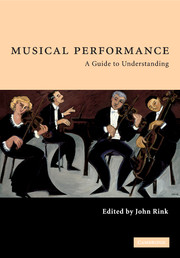Book contents
- Frontmatter
- Contents
- List of contributors
- Preface
- I Conceptions and preconceptions
- 1 Performing through history
- 2 Historical performance and the modern performer
- 3 Analysis and (or?) performance
- 4 Understanding the psychology of performance
- II Learning to perform
- III Making music
- IV Interpreting performance
- Index
- References
2 - Historical performance and the modern performer
Published online by Cambridge University Press: 05 June 2012
- Frontmatter
- Contents
- List of contributors
- Preface
- I Conceptions and preconceptions
- 1 Performing through history
- 2 Historical performance and the modern performer
- 3 Analysis and (or?) performance
- 4 Understanding the psychology of performance
- II Learning to perform
- III Making music
- IV Interpreting performance
- Index
- References
Summary
‘Interpretation’
This chapter is addressed to ‘modern performers’ regardless of whether they sing with or play modern or period instruments. We may start by considering the question ‘What exactly should we try to do in performing music written before our own time?’ In fact, the answer is essentially the same for early music as it would be for a new composition. Most performers would think in terms of being true to the work, of exploring its emotional content, of attempting to honour the composer's intentions. We value imagination and originality in performers, but recognise that (normally) this serves the music they perform, helping to illuminate its character or make palpable its emotional content. By and large, we are not so happy when a performer's imagination distorts or disguises the music on which it is exercised.
This process of realising a musical work in sound is generally called ‘interpretation’ – though some composers have been very uncomfortable with all that this implies. Famously, Ravel proclaimed, ‘I do not ask for my music to be interpreted, but only for it to be played’, a remark echoed by Stravinsky when he wrote, ‘Music should be transmitted and not interpreted, because interpretation reveals the personality of the interpreter rather than that of the author, and who can guarantee that such an executant will reflect the author's vision without distortion?’ Their complaint, clearly, was with wilful renditions in which performers' whims unjustified by anything in the score are conspicuous.
- Type
- Chapter
- Information
- Musical PerformanceA Guide to Understanding, pp. 17 - 34Publisher: Cambridge University PressPrint publication year: 2002
References
- 7
- Cited by



